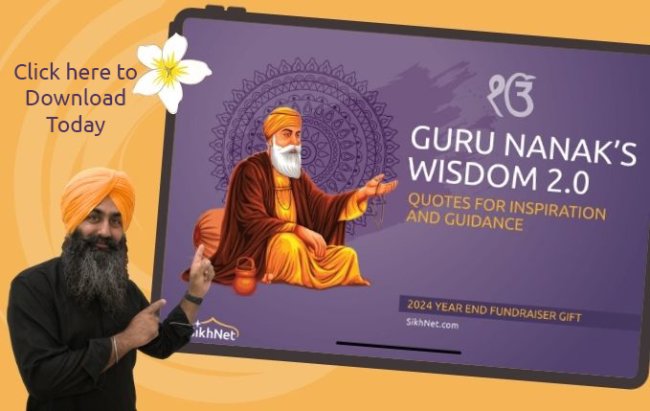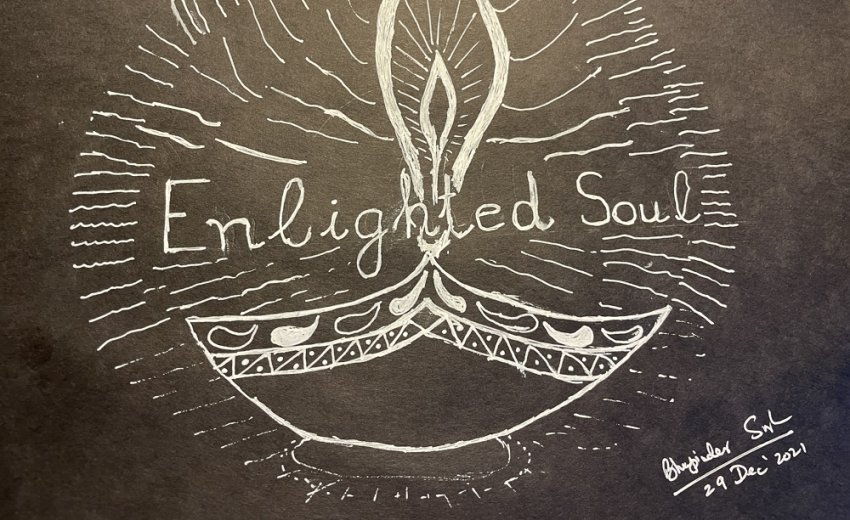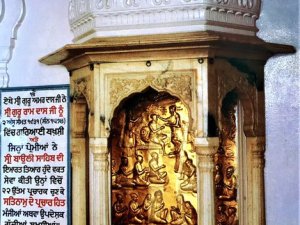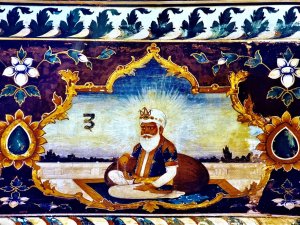Sri Guru Granth Sahib (SGGS) is a repository on numerous topics, where somehow, we fail to comprehend the depths after reading it, hearing commentaries and even after using exigencies to understand them. It is not just a predicament for an average layman, but also the intellectuals with pristine academic credentials. What is the reason for this disconnect? It is because our consciousness level has not evolved high enough from where this thought process is emanating. So, the result is a high academic advancement or a total lack of it as with an illiterate, does not make a difference as both don’t get very far. This is a comprehension challenge, which needs further exploration. Let us investigate it with an example. In SGGS there is a statement as under:
“ਜਿਸ ਤੇ ਉਪਜਿਆ ਨਾਨਕਾ ਸੋਈ ਫਿਰਿ ਹੋਆ ॥੨॥”
“Jis te upajiaa naanakaa soiee fir hoaa. 2.” (SGGS, Pg. No. 1193)
Translation: And the One, from whom we came, O Nanak, into Him we merge once again. ||2||
Without that personal experience of reemergence, we cannot authentically relate to it. In order to relate to this statement our consciousness level has to soar higher. When our consciousness approaches those heights then the perspectives of an enlightened soul will become relatable. Scaling to those peaks of the consciousness level the person becomes enlightened, the pinnacle of human evolution. Let us take a shabad by Sant Kabir in SGGS, to get a perspective of an enlightened soul:
“ਨਾ ਇਹੁ ਮਾਨਸੁ ਨਾ ਇਹੁ ਦੇਉ ॥ ਨਾ ਇਹੁ ਜਤੀ ਕਹਾਵੈ ਸੇਉ ॥
ਨਾ ਇਹੁ ਜੋਗੀ ਨਾ ਅਵਧੂਤਾ ॥ ਨਾ ਇਸੁ ਮਾਇ ਨ ਕਾਹੂ ਪੂਤਾ ॥੧॥
ਇਆ ਮੰਦਰ ਮਹਿ ਕੌਨ ਬਸਾਈ ॥ ਤਾ ਕਾ ਅੰਤੁ ਨ ਕੋਊ ਪਾਈ ॥੧॥ ਰਹਾਉ ॥
ਨਾ ਇਹੁ ਗਿਰਹੀ ਨਾ ਓਦਾਸੀ ॥ ਨਾ ਇਹੁ ਰਾਜ ਨ ਭੀਖ ਮੰਗਾਸੀ ॥
ਨਾ ਇਸੁ ਪਿੰਡੁ ਨ ਰਕਤੂ ਰਾਤੀ ॥ ਨਾ ਇਹੁ ਬ੍ਰਹਮਨੁ ਨਾ ਇਹੁ ਖਾਤੀ ॥੨॥
ਨਾ ਇਹੁ ਤਪਾ ਕਹਾਵੈ ਸੇਖੁ ॥ ਨਾ ਇਹੁ ਜੀਵੈ ਨ ਮਰਤਾ ਦੇਖੁ ॥
ਇਸੁ ਮਰਤੇ ਕਉ ਜੇ ਕੋਊ ਰੋਵੈ ॥ ਜੋ ਰੋਵੈ ਸੋਈ ਪਤਿ ਖੋਵੈ ॥੩॥
ਗੁਰ ਪ੍ਰਸਾਦਿ ਮੈ ਡਗਰੋ ਪਾਇਆ ॥ ਜੀਵਨ ਮਰਨੁ ਦੋਊ ਮਿਟਵਾਇਆ ॥
ਕਹੁ ਕਬੀਰ ਇਹੁ ਰਾਮ ਕੀ ਅੰਸੁ ॥ ਜਸ ਕਾਗਦ ਪਰ ਮਿਟੈ ਨ ਮੰਸੁ ॥੪॥੨॥੫॥”
Transliteration:
“Naa ih maanas naa ih deo. Naa eh jatee kahaavai seau.
Naa ih jogee naa avadhootaa. Naa is mai na kaahoo pootaa. 1.
Eiaa mandhar meh kauan basaiee. Taa kaa aant na kouoo payee. 1. Rahaau.
Naa ih girahee naa odhaasee. Naa ih raaj na bheekh mangaasee.
Naa is pindd na rakatoo raatee. Naa ih brahaman naa ih khaatee. 2.
Naa ih tapaa kahaavai seikh. Naa ih jeevai na marataa dhekh.
Eis marate kau je kouoo rovai. Jo rovai soiee pat khovai. 3.
Gur prasaadh mai ddagaro paiaa. Jeevan maran dhouoo miTavaiaa.
Kahu Kabir ih raam kee ans. Jas kaagadh par miTai na mans. 4. 2. 5.” (SGGS, Pg. No. 871)
Translation:
It is not human, and it is not angelic. It is not called celibate, or a worshipper of (god) Shiva.
It is not a Yogi, and it is not a hermit. It has neither a mother, nor it is anyone's son. ||1||
Then what is it, which dwells in this temple of the body? No one can find its limits. ||1||Pause||
It is not a householder, and it is not a renouncer of the world. It is not a king, and it is not a beggar.
It has no body, no drop of blood. It is not a Brahmin (priest caste), and it is not a Khattri (warrior caste). ||2||
It is not called a man of austere self-discipline, or a Sheikh. It is not born (to live), and it is not seen to die.
If someone cries over its death, that person loses his credibility. ||3||
By Guru's Grace, I have found the Path. Birth and death have both been erased.
(Now) Kabir says, it is formed of the same essence as the Lord. It is like the ink on the paper which cannot be erased. ||4||2||5||
Here, Kabir Ji has declared that he has found his true SELF. It can be termed as enlightenment, Self-Realization, Atam-Gyan, Brahm-Gyan, Mukti, Moksha, etc. Kabir Ji has actually shared something very unique, the aspects of soul with us. As very rare are those who have its authentic experience firsthand, consequently not much is written about it. That rarity of experience makes the verbalization of his own experiences by Kabir Ji very captivating. In the Rahaao lines, he poses the question first, which he wants to address. He queries who resides in this temple of human body, whose ends or limits are not known to anyone? In the first three stanzas he shares what soul is not, and finally in the fourth stanza he declares that he found the path, which resulted in his erasing the cycles of births and deaths. He further realized that his true being is a part of God, thus divine, which cannot be effaced exactly like its source God. Let us walk through the imagery used by Kabir Ji after his revelation:
- Kabir Ji realized that I am, or my true self is neither human nor angelic.
- Neither it is a celibate, nor a worshipper of Shiva.
- Neither it is a yogi, nor a hermit.
- Neither it has a mother, nor it is anyone’s son/child.
Here Kabir Ji is wonderstruck, then what is inside the body? Kabir Ji has encountered something which is a mystery and will ever remain a mystery. He has expressed that mystery which defies description as “No one can find its limits.” It is this mysterious experience that fills one with unimaginable joy, ecstasy, peace, calmness, and thrill. After this experience, a yearning to unfold the mystery evaporates completely, replaced with awe as its newer facets are experienced. He continues:
- Neither it is householder, nor a renouncer.
- Neither it is a king, nor a beggar.
- Neither this self has a body, nor a drop of blood.
- Neither it is a Brahmin, nor a Khattri (Chettri).
- Neither it can be called austere, nor a sheikh.
Kabir Ji’s endless dive into this bottomless ocean of experiences unfolds as:
- Neither this lives, nor has anyone seen it dying.
- If someone weeps thinking that it has died, will be held in contempt because a regression of thought process has taken place (the eternal soul has been called as dead).
In the end, Kabir Ji reveals how he arrived at such high state of evolution and gained this new perspective of his own authentic reality:
- By fully conforming with the guidance and thus earning the Guru’s grace, I found the path. The result was cessation of cycles of rebirths and deaths.
- Finally, Kabir Ji makes an extremely profound statement with absolute clarity. He says that self is part of Divine and cannot be separated from it. Just as ink on paper is inseparable from it, similar is the relationship between individual and Divine – Inseparable and forever.
The very purpose of introducing this shabad above by Kabir Ji is to share an eyewitness account of an enlightened person. As we have not personally experienced it, relating to it is difficult. The human journey got completed in the process, with its purpose accomplished. The source from which the mortal began the human journey immersed back into it, thus life’s journey got completed. Guru Arjan Ji has expressed that experience in these words:
“ਸਫਲ ਸਫਲ ਭਈ ਸਫਲ ਜਾਤ੍ਰਾ ॥ ਆਵਣ ਜਾਣ ਰਹੇ ਮਿਲੇ ਸਾਧਾ ॥੧॥ ਰਹਾਉ ਦੂਜਾ ॥੧॥੩॥”
“Safal safal bhiee safal jaatraa. Aavan jaan rahe mil saadhaa. 1. Rahaau dhoojaa. 1. 3.” (SGGS, Pg. No. 687)
Translation: My Yatra, my life pilgrimage, has become fruitful, fruitful, fruitful. My comings and goings have ended since I met the Holy Saint (Guru). ||1||Second Pause||1||3||
That essence is part of Divine and once it merged back in it, the soul was enlightened and liberated from the life cycles of births and deaths. This is a recurring theme in the body of Sri Guru Granth Sahib. The essence of the message is to realize the real thing within us, which is neither a body nor its constituents, but soul. Below are few additional quotes to reinforce the same theme are being shared:
“ਜਿਸ ਤੇ ਉਪਜਿਆ ਤਿਸੁ ਮਾਹਿ ਸਮਾਨਾ ॥”
“Jis te upajiaa tis maeh samaanaa.” (SGGS, Pg. No. 285)
Translation: He is absorbed into the One, from whom he originated.
“ਜਿਸ ਤੇ ਉਪਜੇ ਤਿਸੁ ਮਹਿ ਪਰਵੇਸ ॥”
“Jis te upaje tis meh paraves.” (SGGS, Pg. No. 898)
Translation: I have entered into the One, from whom I originated.
The above two statements are declarations of the accomplishments of the enlightened soul. Such declarations are rare, while the rest of us whether laymen or accomplished with our worldly education have not experienced it. This means that we have not yet evolved to the apex of the evolutionary heights to appreciate Kabir’s own experience. It is evolution to the level from where no further evolutionary growth is possible. That experience is the successful completion of the human journey, which puts an end to the cycles of births and deaths. But what about failure to achieve this experience? This is a conundrum that begs an answer to the consequences of failure.
Consequences of failure
As per Gurbani the consequences are catastrophic:
“ਮੂਲੁ ਨ ਬੂਝਹਿ ਆਪਣਾ ਸੇ ਪਸੂਆ ਸੇ ਢੋਰ ਜੀਉ ॥੩॥”
“Mool na boojheh aapanaa se pasooaa se ddor jeeau. 3.” (SGGS, Pg. No. 751)
Translation: They do not understand their own roots; they are beasts. They are just animals! ||3||
“ਬਿਨੁ ਬੂਝੇ ਪਸੂ ਕੀ ਨਿਆਈ ਭ੍ਰਮਿ ਮੋਹਿ ਬਿਆਪਿਓ ਮਾਇਆ ॥”
“Bin boojhe pasoo kee niaaiee bhram moh biaapio maiaa.” (SGGS, Pg. No. 1300)
Translation: Without realizing this self, one is no different than the beasts, engrossed in illusion, doubt, emotional attachment and Maya.
“ਬਿਨੁ ਬੂਝੇ ਤਨੁ ਮਨੁ ਫੀਕਾ ਹੋਇ ॥”
“Bin boojhe tan man feekaa hoi.” (SGGS, Pg. No. 158)
Translation: Without understanding, (both) the body and the mind become tasteless and insipid.
“ਬਿਨੁ ਬੂਝੇ ਤੂੰ ਸਦਾ ਨਾਪਾਕ ॥੪॥”
“Bin boojhe too(n) sadhaa naapaak. 4.” (SGGS, Pg. No. 374)
Translation: Without understanding, you shall be forever impure. ||4||
“ਬਿਨੁ ਬੂਝੇ ਕੋ ਥਾਇ ਨ ਪਾਈ ॥”
“Bin boojhe ko thai na payee.” (SGGS, Pg. No. 412)
Translation: Without understanding, he is not approved.
“ਬਿਨੁ ਬੂਝੇ ਵਡਾ ਫੇਰੁ ਪਇਆ ਫਿਰਿ ਆਵੈ ਜਾਈ ॥”
“Bin boojhe vaddaa fer piaa fir aavai jaiee.” (SGGS, Pg. No. 511)
Translation: Without understanding, one must wander around in the cycles of reincarnations, and continue coming and going.
“ਮੂਲੁ ਨ ਬੂਝਹਿ ਸਾਚਿ ਨ ਰੀਝਹਿ ਦੂਜੈ ਭਰਮਿ ਭੁਲਾਈ ਹੇ ॥੩॥”
“Mool na boojheh saach na reejheh dhoojai bharam bhulaiee hae. 3.” (SGGS, Pg. No. 1024)
Translation: The mortal does not know self and have no interest in finding the True-Self. He goes on wandering in illusion of other (besides True reality). ||3||
“ਮੂਲੁ ਨ ਬੁਝੈ ਆਪਣਾ ਵਸਤੁ ਰਹੀ ਘਰ ਬਾਰਿ ॥”
“Mool na bujhai aapanaa vasat rahee ghar baar.” (SGGS, Pg. No. 56)
Translation: The mortal does not experience the very essence, which is within him unexplored.
“ਬਿਨੁ ਬੂਝੇ ਕੈਸੇ ਪਾਵਹਿ ਪਾਰੁ ॥”
“Bin boojhe kaise paaveh paar .” (SGGS, Pg. No. 84)
Translation: But without understanding, how can they cross over to the other side?
Guru Ji is saying without this understanding one is an animal at consciousness level and cannot crossover. But that statement should not dishearten us as in SGGS we find reassurance that we the humans are ordained to come back to the source. The Sender as the Divine being within us, is calling upon us to return by saying:
“ਜਿਨਿ ਤੁਮ ਭੇਜੇ ਤਿਨਹਿ ਬੁਲਾਏ ਸੁਖ ਸਹਜ ਸੇਤੀ ਘਰਿ ਆਉ ॥”
“Jin tum bheje tineh bulaae sukh sahaj setee ghar aau.” (SGGS, Pg. No. 678)
Translation: The mortal is being called into his real, everlasting abode. Go back in total bliss and utmost poise.
Besides inviting, the divine is also removing the hurdles and struggles from the path, making those things of the past as:
“ਤੁਮ ਘਰਿ ਆਵਹੁ ਮੇਰੇ ਮੀਤ ॥ ਤੁਮਰੇ ਦੋਖੀ ਹਰਿ ਆਪਿ ਨਿਵਾਰੇ ਅਪਦਾ ਭਈ ਬਿਤੀਤ ॥ ਰਹਾਉ ॥”
“Tum ghar aavahu mere meet. Tumarae dhokhee har aap nivaare apadhaa bhiee biteet. Rahaau.” (SGGS, Pg. No. 678)
Translation: Come back to your home, O my friend. The Lord Himself has eliminated your enemies, and your misfortunes are past. ||Pause||
Once the reemergence in source has taken place, poise and bliss has been experienced then it can be said that consciousness has evolved to its pinnacle. The understanding and experience of the soul is transformative, then comprehending the depths Guru’s words will cease to be a challenge, instead they will become relatable through their own personal experiences. Afterall the soul completes the journey in merger with Divine, which is also called enlightenment.
Acknowledgement: I would like to acknowledge the input, and personal insights offered by Bhai Jaspal Singh (USA) in preparation for this write-up. Without it this write-up would not have happened.
References:






